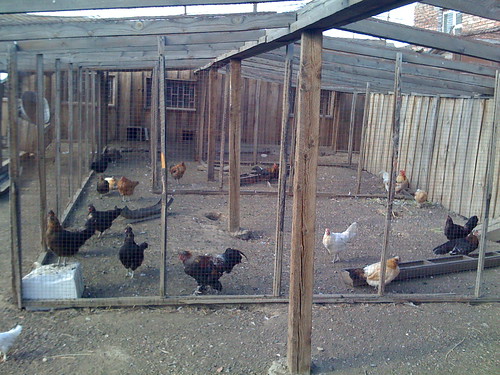The Mongolian Women Farmers' Association (MWFA)
Mongolia is one of the areas of the world experiencing serious desertification.1 It is also a country with a low per capita income — $1,680 in 2008.2 The Mongolian Women Farmers' Association, founded in 1999 by a native agronomist and farmer named Byatshandaa Jargal, is working to help improve this ecological and economic situation.
(Women's World Summit Foundation)
As detailed in a December 2007 report (pdf) published by The Asia Foundation, which has provided MWFA with some funding, the MWFA's mission is to provide training, especially to female single parents, in how to raise organic vegetables and poultry. MWFA is also involved in planting trees and maintaining orchards.

(Dominic Hannigan's blog)
It is important to understand that growing vegetables is not something Mongolians have traditionally had experience with because the traditional — nomadic — diet is comprised mainly of meat, dairy products, and flour.
By adding vegetables (e.g., potatoes, cabbage, cucumbers, and carrots), mothers markedly enhance the quality of the family diet. In adition, income from selling surplus produce helps pay family expenses such as school fees, fees for medical services, and investment in household assets (e.g., cars, furniture, wells, mobile phones, TVs, computers).
MWFA has three training centers: in Bayankhoshuu (a Ger area in the western part of Ulaanbaatar, which is MWFA's base), Bayanzurkh (a Ger area in the eastern part of Ulaanbaatar), and Bayankhonger (the capital of Bayanhongor province in Mongolia's south; the training center is southwest of the city).
All told, the training centers train about 500-600 households a year and also provide follow-up advice. Trainees receive seed packets to get them started and, in some cases, a plot of land in a community farm. Otherwise, they do their farming in the land around their home (a ger or a house).
On October 7, Dorjgotov Ariungerel posted a report about Byatshandaa Jargal's work in which he explains how Byatshandaa's training efforts have had increasing impact as trained individuals in their turn train others.
Byatshandaa has written textbooks in Mongolian on vegetable farming and animal husbandry and also teaches vegetable gardening on TV.
The Asia Foundation's 2008 evaluation of MWFA's work was generally laudatory, though it did note a need to provide complementary training on household finances, business, selling, and marketing.
You can read Dominic Hannigan's account of his visit last year to a MWFA ger farm here. Hannigan is a Senator in the Irish Parliament. Another brief 2008 note by Gregory Cowan about the MWFA farm in Bayankhoshuu is here.
__________
1 Brief background information on desertification in Mongolia is provided here by the Swiss Agency for Development and Cooperation.
2 See World Bank (pdf). Mongolia ranks 151 on the World Bank's listing of per capita incomes for 210 countries.
Labels: Asia, Cooking and food
<< Home